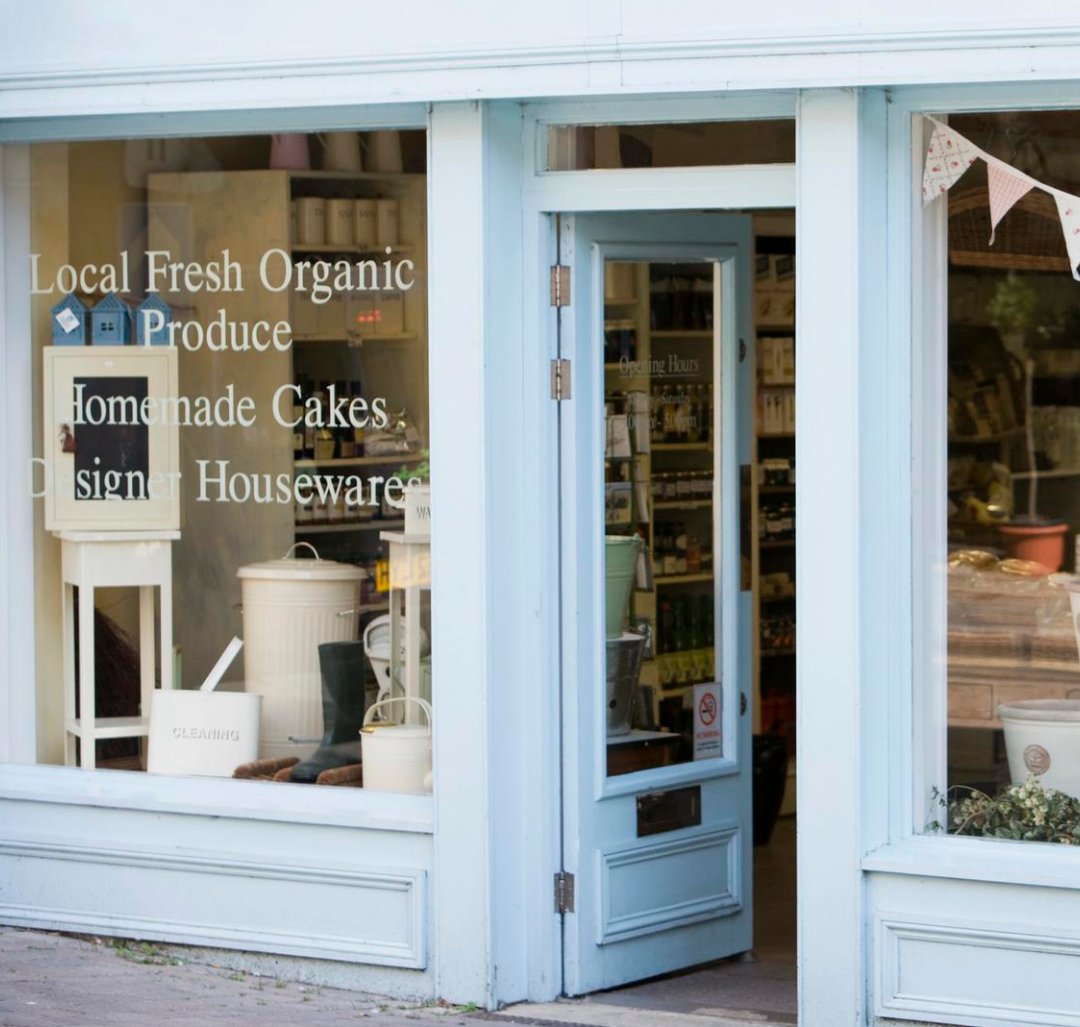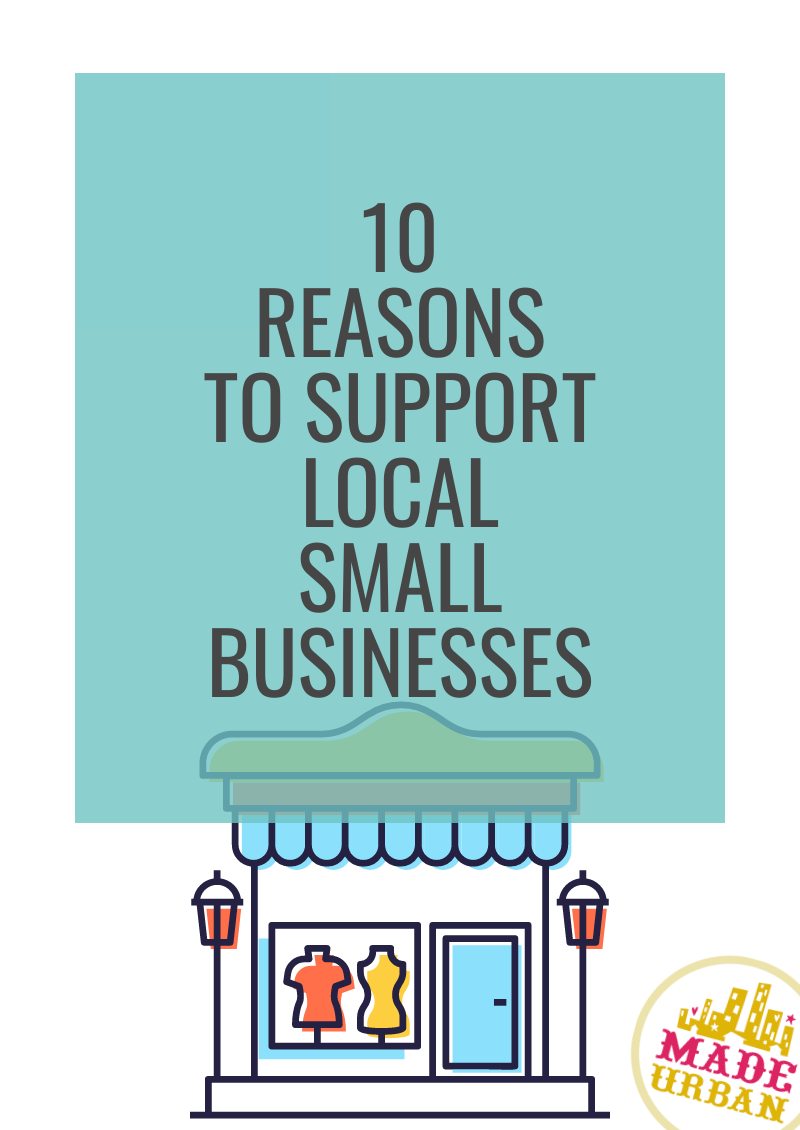10 Reasons to Support Local Small Businesses
It’s not always the most convenient or the cheapest option to buy from a local business, but the upsides of supporting local are greater than the downsides.
Let’s look at the ways supporting local businesses benefits you in the short and long run. And why big box stores can ultimately be harmful to the local economy and the health of local businesses.
The downsides of big chains
Big box stores that move into a city don’t stimulate the economy more, or attract a mass of people living outside of a city to visit, they simply shift where money is currently being spent.
The population doesn’t all of a sudden start spending more money because a Walmart moved into town.
They stop spending their dollars at existing businesses and start shopping at the large chain due to convenience, lower cost, or selection.
A study found that 85% of sales for a new Walmart came at the expense of existing businesses in that area and only 16% were new sales from people outside of the city, attracted to the big new store (source).
Where does big box money go?
When a company has several chains across the country, they have a head office somewhere (most likely not in your hometown unless you live in a big metropolitan city).
In general, this head office houses a huge team that takes care of things like production, marketing, accounting, legal issues, human resources, business development, buying, supplies, etc. Wages are paid to them, instead of someone in your community.
This is all good for the city the head office is located in as those employees will spend the majority of their wages there, stimulating their local economy but your town will most likely never see that money again.

10 Reasons to Support Local Businesses
The following are just a handful of reasons it’s important to support your local businesses.
1) More dollars kept local
The most important benefit of shopping local is that more money is kept in your local community.
Think of an economy as a circle; money is made and spent within the same circle/among the same group of people.
On a small scale, we can look at it this way:
Your employer pays you money, you spend that money with another local business, your money is used to pay the owners and employees of that business, those people then spend that money at your employers business, your employer then has money to continue paying you.
Obviously, the economy of a town/city is a little less linear and there are many more businesses and hands money filters through before it makes its way back to you, but you get the idea.
When your money is spent with a local business, it keeps that healthy economic circle going. Money is made and spent within your local economy.
But now imagine, there are leaks in that circle. You spend money, but instead of the money eventually circling back to you, it leaves the circle. It’s going into someone else’s economy.
How long do you think that can go on before your employer can no longer pay you and you’re out of a job?
Local, independent business owners are often more conscious about where they spend their dollars and are more likely to spend them with other local businesses.
A study found that local businesses return 52% of their revenue into the local economy while big chains return as little as 14% (source).
Local businesses advertise in local publications and pick up office supplies locally as opposed to having them shipped in by a head office. They will hire local architects, designers, signage companies, and contractors to build their store. As well as local service providers for accounting and legal issues.
Those dollars then follow a similar cycle; For example, the local accounting firm will spend their money on local suppliers and service providers.
2) More tourists
If your city is full of big box stores, there’s nothing unique about it. Why would someone visit a new city and buy from a Gap when they have a Gap to buy from in their hometown?
Small businesses offer unique products, services, events, experiences, etc. that can attract tourists.
Those tourists are visiting your city to spend their money.
Your economic circle gets an injection of money.
The business you work for is now making more money and is able to give you a raise or a bonus.
3) Better jobs
When you support a local business, you give it the opportunity to grow. As it grows, it creates more jobs…and better ones at that.
In a company like Walmart, higher (paying) positions like CEO, President, Managing Director, Buyers, etc. are given to people who live in the same city as Walmart’s head office. There’s typically a cap on the type of positions offered in a non-head office city.
On the other hand, when a local business grows, it grows within your city and thus, the higher positions are available in your city too.
4) More community involvement
Local business owners usually have more of an interest in their community and will in turn contribute to local organizations, events, and charities.
5) More commitment
Local business owners have ties to their city and aren’t likely to just pick up and move to another city in hard economic times. When a big box store is underperforming in a city or a part of the city, it’s easy for executives to make the decision to close it down and open a new store in a city that’s preforming well.
6) Less environmental impact
Think about the local small businesses you know. Most of them operate out of small brick-and-mortar shops, or even out of the owners’ homes.
Now think about the big box stores you’re familiar with. Most require huge buildings with big parking lots. They often aren’t in walkable areas. When you need to go to a Walmart, you likely need to drive there, which has an environmental impact.
And when a new big box store moves into town, they may find an existing space to rent, or they may need to build a new retail space. Finding space to fit a big box store often requires a new building on the outskirts of town. This leads to urban sprawl, which has several negative impacts on the environment and a community.
7) Specialty businesses
Large companies appeal to the masses. They’re not worried about serving small groups of people; they want to sell to as many people as possible…the ones who fit within the “norms”.
Small businesses tend to cater to the smaller, underserved markets.
When you support local, you give small businesses a chance to grow and thrive, so they can continue to offer specialty products and service.
You also have better access to local business owners.
If your local Walmart doesn’t carry the product you’re looking for, do you think talking to the manager will get them to stock that product?
Probably not.
You’re one in a million when you’re shopping at a big box store and they’re not going to spend extra time and money to cater to one person.
However, local business owners are almost always interested in hearing feedback from their customers and learning how they can improve. If stocking a specific product means you’ll return to their store each month to purchase from them, chances are they’ll be willing to bring in a new product or offer a specific service.
8) Knowledgeable staff
When compared to small business owners, the employees of big box stores often aren’t as knowledgeable about a specific product or service the store offers,
Think about the last time you went into a Walmart, Home Depot, or other big box store and had a question about a product. Chances are, the employee helping you is a trained sales associate; often not a trained electronics expert, paint specialist, or woodworker.
Now imagine a local business owner who has opened a paint store. They’ve likely done so because they have experience as a painter, are knowledgable on the subject, and believe they can offer a better product/service than what’s currently out there.
If you have a question about why your new paint is peeling, who do you think will be able to help you solve your problem? The teenager hired at Home Depot last week who’s been assigned to the paint section for the day, or the experience painter who’s opened a local paint store and painting service?
When you shop with a local business, often you have direct access to the expert who started the business.
9) Better customer service
The local business owner is more invested in their business and has a lot more to lose than an employee at a big box store who’s one out of a hundred being paid minimum wage.
That’s not to say employees of big box stores don’t care about their jobs or provide good customer service. But if a Walmart closes, it’s easier for a Walmart employee to apply for a job at another big box store.
On the other hand, the local business owner will have a bigger setback if their store closes. And the staff they’ve hired, who likely have a background in the field they’re working in, won’t have as easy of a time finding another job.
The local business owner is going to do their best to make sure every single customer is well taken care of. The owner is also involved in each aspect of their business, including finding the right people to employ and training them.
This leads to a better customer service experience for you.
10) Tax Dollars
Not all tax dollars are charged, remitted, and spent on a municipal level. However, when more dollars are spent locally, they raise the economic activity in your community, which raises the tax base.
Not to mention, when a big box store moves into town, it often requires new infrastructure. New water and electricity lines must be run to the building and new roads must be paved so people can get to the new stores.
Also, those big box stores tend to get tax breaks as an incentive. Cities and towns often want big box stores to come in because of the jobs they create, so they offer tax incentives.
But if we support our hundreds of local businesses, it gives them a chance to grow and create more jobs and tax revenue. It may not happen as quickly when compared to a big box store opening, but it’s the better path in the long-run.
Supporting local doesn’t take a huge change to make a difference. Sometimes shopping a large chain fits into our lives based on time, cost, convenience and stock. But shifting just 10% of your monthly spending from large chains to local restaurants, shops and businesses can make a huge impact on your community.
You may also be interested in the different ways you can support local mom and pop stores: How To Celebrate National Mom and Pop Business Owners Day (and how to support them).
If you’re a small handmade business looking for ways to promote and sell your goods locally, check out:
How To Promote Your Business Locally (& Gain New Customers)
Where to Sell Handmade Crafts Locally (Top 20 Places & Ones you Haven’t Thought of)


Hey, I’m Erin 🙂 I write about small business and craft show techniques I’ve learned from being a small business owner for almost 2 decades, selling at dozens of craft shows, and earning a diploma in Visual Communication Design. I hope you find my advice helpful!

